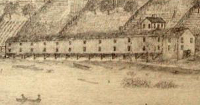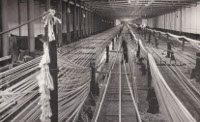Places in Middle-earth
Tighfield
Type: Cities, Towns, Settlements
Region: Bree/The Shire
Location: A town in the Shire known for rope-making; the home of several of Sam Gamgee's forebears.
Description:
'I do know something about rope and about knots. It's in the family, 1 as you might say. Why, my grand-dad, and my uncle Andy after him, him that was the Gaffer's eldest brother he had a rope-walk over by Tighfield many a year.'
The Two Towers, LoTR Book 4, Ch 1, The Taming of Sméagol
Etymology
Tighfield. This is intended to contain an old word for 'rope' (surviving in some of the senses of the modern English noun tie, in which the spelling is assimilated to that of the related verb tie). It was the site of a 'rope-walk' or rope-maker's yard. It would be best translated by some other word for 'rope' than that used in 'rope-walk'. Related are Icelandic taug and the word with various forms toug, tov, tog, in Danish and Norwegian; also nautical German (from Low German) tou.
Note that English 'rope-walk' seems to have been misunderstood by translators; certainly the Swedish, with en repbro över älven borta vid Slättäng. There is no mention of a river in my text (II 217; Swedish II 249). Nor is it easy to see why having a 'rope-bridge' over a river would beget an inherited knowledge in the family about the nature of ropes, and their making. The Dutch has touwbrug, which I suspect is also due to misunderstanding. I do not know the technical equivalent of 'rope-walk' in other languages: dictionaries give German Seilerbahn, and Danish reberbane, but these also are possibly mistaken? A 'rope-walk' (known in English since the seventeenth century) is so called because the ropes were stretched out in long lines over trestles at intervals.
The Swedish Slättäng and Dutch Weideveld do not, of course, translate Tighfield as above defined, and are probably mere contextual guesses. There is, however, another place-name element (peculiar to English) that has the same forms as the 'rope' word, though it is probably not related: in modern place-names tigh, teigh, tye, tey. This meant an enclosed piece of land. It does not occur as the first element in a compound.
"Guide to the Names in The Lord of the Rings" by J.R.R. Tolkien, edited by Christopher Tolkien
From A Tolkien Compass, compiled by Jared Lobdell
Chicago: Open Court Pub Co, June 1975
Notes
1 According to the "The Longfather-Tree of Master Samwise", Sam's great-great grandfather, Wiseman Gamwich "removed to Tighfield", where his son Hob "the Roper" Gammidge ("Old Gammidgy"), his grandson (Sam's grandfather) Hobson "Roper" Gamgee, and his great-grandson (Sam's uncle) Andwise "Andy" Roper had their homes, presumably all practicing the craft of rope-making.
The Lord of the Rings, Appendix C, Family Trees
Contributors: Elena Tiriel 14Mar10


